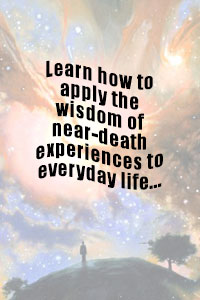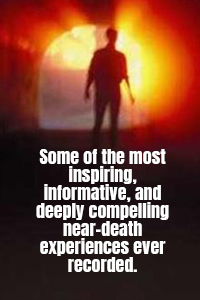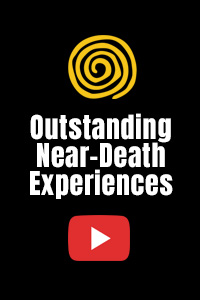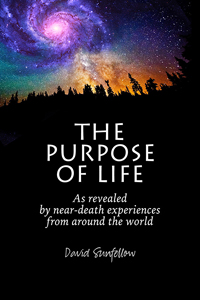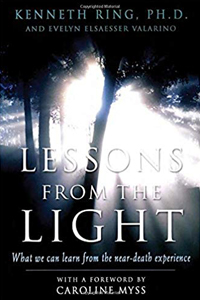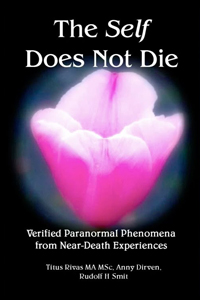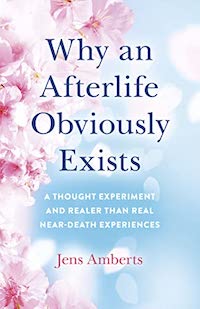Shadow Work: Insights From The Pathwork Lectures
By David Sunfellow
The Pathwork Lectures of Eva Pierrakos provide an exceptionally insightful overview of personal growth and the spiritual path. Along with viewing and encouraging personal growth in a very well-rounded way, the Pathwork Lectures are unique in terms of how much, and how clearly, they deal with shadow issues. To give you a taste of this remarkable material, I’ve included a few of my favorite quotes below. If you want to read these quotes in context, or see the complete lecture that they are taken from, you can find all 258 Pathwork Lectures posted here. Audio recordings of the lectures are located here. You can find a quick overview of where the Pathwork Lectures came from and what, exactly, they teach posted here. And you can find current information about the Pathwork organization on their website.
…………
“Relationship represents the greatest challenge for the individual, for it is only in relationship to others that unresolved problems still existing within the individual psyche are affected and activated.”
— Pg. 93, The Pathwork of Self-Transformation
…………
 “Often the dualistic misunderstanding that either you depend on yourself and therefore must be all alone, or that you are in a fulfilling relationship and then utterly depend on the other, prevents you from even wanting to assume self-responsibility. Doing so seems to require giving up all hope for a loving partner. Exactly the opposite is true. Only as you bring your feelings back to yourself, tap the resources within yourself and open the wells of your giving and loving feelings, will fulfillment become an inevitable reality.”
“Often the dualistic misunderstanding that either you depend on yourself and therefore must be all alone, or that you are in a fulfilling relationship and then utterly depend on the other, prevents you from even wanting to assume self-responsibility. Doing so seems to require giving up all hope for a loving partner. Exactly the opposite is true. Only as you bring your feelings back to yourself, tap the resources within yourself and open the wells of your giving and loving feelings, will fulfillment become an inevitable reality.”
— Pg. 126, The Pathwork of Self-Transformation
…………
“You are never, never dependent on another person, even if it seems that way. That is the illusion of the world of manifestation. The teachings and the path I show you must prove to you forever more that it is you yourself who inflict difficulties, conflicts, and hurts on yourself, no matter how much the other person may be at fault. If you are free of images, illusions, wrong conclusions and wrong concepts, the wrong deeds of others can never affect you. You will adjust to the world and the happy or unhappy incidents in your life; favorable or unfavorable happenings will have exactly the same affect on you.”
— Pathwork Guide Lecture 52
…………
“So often man concentrates unduly on the apparent injustice that has come to him. He thinks and thinks again of how wrong others are. This can and should be recognized. But try to find out how you have helped bring this about. If you make half the effort you usually make finding other’s faults to find your own, you will see the connection with your own law of cause and effect and this alone will set you free, will show you that there is no injustice. This alone will show you that it is not God, nor the fates, nor any unjust world order wherein you have to suffer the consequences of other people’s shortcomings, but your ignorance, your fear, your pride, your egotism that directly or indirectly caused that which seemed, so far, to come your way without you attracting it….Your own unconscious affects the unconscious of the other person. This truth is perhaps most relevant to the discovery of how you call forth all happenings in your life, good and bad, favorable and unfavorable.”
— Pathwork Guide Lecture 52
…………
“The conscious ego must reach down and say, ‘Whatever is in me, whatever is hidden that I ought to know about myself, whatever negativity and destructiveness there is, it should be out in the open; I want to see it. I commit myself to seeing it, regardless of the hurt to my vanity; I want to be aware of how I deliberately refuse to see my part and how I therefore overconcentrate on the wrongs of others.’ This is one direction of meditation.
“The other direction of meditation must point toward the Universal, Higher Self, which has powers that surpass the limitation of the conscious self. These higher powers should also be called upon for the purpose of exposing the destructive little self, so that resistance can be overcome. The ego-will alone may be incapable of accomplishing this. But the ego can and must meditate to request the High Powers to help. The Universal Consciousness should also be asked to help your consciousness understand the expressions of the destructive infant correctly, proportionately, without exaggeration, without losing a sense of reality in the opposite direction. A person can easily fluctuate from an outer self-aggrandizement to a hidden inner self-depreciation. When the destructive infant reveals itself, the person could fall prey to believing this destructive self to be the final, ultimate, sad reality. To give a full sense of reality surrounding the revelation of the egotistic infant, the guidance of the Universal Self must constantly be sought.”
— Pathwork Guide Lecture 182
…………
“Three phases of the process of meditation: 1. Recognition of the unconscious destructive egotistical self; 2. Recognition of the underlying misconceptions, the causes and effects, the meaning and the price to be paid in regard to the present destructive attitudes; 3. Reorientation, re-education of the destructive part of self.”
— Pathwork Guide Lecture 182
…………
“Since you are no longer a child, you will seek love in a different way, by giving it instead of by expecting it.”
— Pathwork Guide Lecture 73
…………
“First, your thinking and your attitudes change; then the feelings follow suit; then your actions and reactions begin to respond to new spontaneous impulses. And these, in turn, bring forth new life experiences.”
— Pg. 177, The Pathwork of Self-Transformation
…………
“Each living individual has the understandable tendency to want to appear superior when he deals with his fellow creatures. He hides his faults, he hides his shortcomings and he wants to show his best side. Why? This is because he craves admiration, he craves acceptance, and he craves love. He thinks that showing his best side will bring him love. And yet all of you know that if you want to receive love, you have to give it first. Do you really give love by impressing other people? In effect, this is what you actually believe consciously and subconsciously. On the other hand, you very decidedly give love in the deepest sense if you give and show yourself as you really are, without any masks…
“If you show yourself as you really are, with all your weaknesses and without any pretense, you make a great and generous gift; your brother or sister will say and feel, ‘Well, he is not any better than I am,’ and it will give him a lift. He will relax, will feel less lonely. Then do you know what will happen? You will receive in this way exactly what you have set out to gain: love, admiration.”
— Pathwork Guide Lecture 17
…………
“When you want to be special in order to triumph over others, when your uniqueness exists at the expense of others and measures itself against others, this uniqueness is destructive and must lead to innumerable problems.
“But when you realize that your own specialness can be unlocked without measuring yourself against others, you will have no problem whatsoever. You will be free to unblock and unfold the best in yourself without infringing upon other people’s rights or needs. Quite the contrary, your best will contribute to others rather than take away from them and you will give your best without the need to cheat, to get by, to get more than you give.”
— Pathwork Guide Lecture 148
…………
“The more the man strives to prove his friend wrong, the more friction is created. He believes that by proving himself right and the friend wrong, the friend will finally accept and love him again and all will be well. When this does not occur, he misinterprets it and tries harder; he thinks he has not sufficiently proven that he is right and the other wrong. The rift widens and his anxiety increases. The more weapons he uses in his effort to win the fight, the deeper into difficulty he gets, until he actually damages himself and the other and acts against his own best interest. He is now faced with a further conflict which has arisen out of the first error and dualistic split. In order to avoid a total rift, with all its real and imagined dangers–for real damage has begun to be wrought–he is now faced with the alternatives of having to give in to appease and avoid damage to himself, or to continue fighting. Since he is still convinced that there is a right and a wrong, appeasement robs him of self-respect. Whether he uses this ‘solution’ or not, he will be torn between the two alternatives: fighting or submitting. Both create tension, anxiety, and inner and outer disadvantages.
“The act which appears to be the most difficult for a man to perform but which, in reality, is the easiest and most unstrained act possible, is to ask, ‘What is the truth of the matter?’ The moment an individual is more bent on the truth than on proving that he is right, he contacts the Divine principle or transcendent, unified truth. If the desire to be in truth is genuine, inspiration must come forth. No matter how much circumstances seem to point in one direction, man must be willing to relinquish and question that what he sees is all there is to the issue. This generous act of integrity opens the way to the Real Self. This act will be easier to perform when man contemplates that it is not necessarily a question of either/or, but that there may be aspects of right in the other and of wrong in himself that, so far, he has not seen because his attention was not directed to this eventuality.
“With this approach to a problem, man immediately opens the way to enter into the unified plane of existence and to be moved by the Real Self. This immediately releases an energy which is distinctly felt when this act is committed in a deep, and sincere way. It also brings release of tension. What he then finds out is always totally different from both what he hoped for and feared on the dualistic plane. He finds that he is not as right and innocent as he thought, nor as wrong as he feared, nor is the opponent. He soon discovers aspects in the matter that he never saw before, although they were not necessarily concealed. He understands exactly how the quarrel came into existence in the first place, what led to it, its history before its actual manifestation. With this he gains insight into the nature of the relationship, he learns about himself and the other and he increases his understanding of the laws of communication. The more vision he thus gains, the freer, stronger, and more secure he feels.”
— Pathwork Guide Lecture 143
…………
“I will try to tell you how God can be found, THE ONLY WAY HE CAN BE FOUND, regardless of what religion or philosophy you believe in. You can only find God within yourself by going through your lower self. That is the only way. If you have a treasure hidden under a great deal of dirt and soil, the only way you can get to that treasure is by digging up the dirt. This means that you have to come in close contact with it for a while. You cannot shirk handling this dirt. You know that this task is worthwhile in order to get your treasure free. So you do it temporarily in order to get the unpleasant work over and done with once and for all…”
— Pathwork Guide Lecture 28
…………
“Opening to the greater universal consciousness must not be approached in a spirit of magic that is supposed to eliminate the becoming, the growing, the learning process. Now, in whatever way this ultimate power is supposed to fill and sustain you, your outer mind must go through the steps of acquiring whatever knowledge and know-how are necessary. You see this in the fields of arts and sciences. You cannot be inspired as a great artist, no matter how much genius you have, unless you learn the craft and the technical dexterity. If the childish, lower self wants to use the channel to the greater universe in order to avoid the initial tedium of learning and becoming, the channel will remain closed. For this amounts to cheating, and God cannot be cheated.”
— Pathwork Guide Lecture 224
…………
“Little by little, you will all enjoy the glory that life can be, even on this earth sphere. Learn to enjoy the serious and honest labor…that leads to it. Do not seek for miracles, tricks, and short-cuts to happiness. It cannot be.”
— Pathwork Guide Lecture 56
…………
“The human condition can best be expressed, in a broad, overall way, in terms of the following levels of consciousness: THE HIGHER SELF, which is the God-Consciousness; THE LOWER SELF, which is the demonic self; and THE MASK SELF, which hides the demonic…. The aim…is to unify all these levels so that the mask and lower selves dissolve and only the true Higher Self manifests and expresses Itself.”
— Pathwork Guide Lecture 193
…………
“Only when the lower and mask selves are entirely conscious and their exact manifestation understood can misconceptions be corrected.”
— Pathwork Guide Lecture 193
…………
“The levels to be worked with on the path — each in a different way — are the following aspects of the human personality: 1. The level of mind and thought; 2. The level of will; 3. The level of feelings; 4. The level of physicality and physical expression. When all these levels are conscious, when their inevitable divergence from each other is faced and accepted, a unification process can begin. When the lower self is understood, accepted, and dissolved, and when the mask is dispensed with, then unification in the spiritual reality of being can take place in a realistic way.”
— Pathwork Guide Lecture 193
…………
“Three phases of the process of meditation: 1. Recognition of the unconscious destructive egotistical self; 2. Recognition of the underlying misconceptions, the causes and effects, the meaning and the price to be paid in regard to the present destructive attitudes; 3. Reorientation, re-education of the destructive part of self.”
— Pathwork Guide Lecture 182
…………
“You may begin each meditation by asking yourself, ‘What do I really feel at this moment? About this or that issue? In what respect am I dissatisfied? What is it I look away from?’ You may request the universal spirit in you to help you find these particular answers. Then wait trustingly for what may unfold. Only when it unfolds can you have a direct confrontation, communication, or dialogue with it and ask it further questions, as well as instruct it. With patience and determination you can remold the distorted part, but only after it has fully expressed itself. You can re-form, reorient stagnant psychic energy with your willingness to be totally honest, totally constructive, loving and open. If you find an unwillingness in this regard, then that must be confronted, explored and re-educated.”
— Pathwork Guide Lecture 182
…………
“Rushing and pressuring the resisting part is as useless and ineffective as its direct refusal to budge. When the conscious ego does not recognize that there is a part of the self that actually refuses every step toward health, unfoldment, and the good life, a counter-active movement may be one of a hurried, impatient pressure…. When you feel yourself stymied and hopeless, it should be a sign for you to search for that part of you that says, ‘I do not wish to change, I do not wish to be constructive.’ Set out and find this voice. Use meditation here to explore and let the worst in you express itself.”
— Pathwork Guide Lecture 182
…………
“Immature emotions have to express themselves. Only as they are allowed expression, so that you can understand their meaning and significance, will you finally reach a point when you no longer need such immature emotions. This will not happen through a process of will, an outer mental decision which represses what is still a part of your emotional being, but through an organic process of emotional growth wherein feelings will naturally change their direction, their aim, their intensity, their nature. But this can only be done if you experience your emotions as they exist in you now.”
— Pathwork Guide Lecture 89
…………
“Once rage is admitted to exist and fully experienced in a way that is not destructive to anyone, under the proper circumstances and in a manner which at one and the same time lets one fully identify with the emotion and yet keep a sense of proportion about it — without rejecting the total personality because of it — the rage will transform itself into warmth, pleasure feelings, love. This transformation may occur directly or indirectly via a number of other emotions such as sadness, self-pity, pain, healthy aggression, and self-assertion. All these energy-currents must be experienced and owned up to, they must be allowed to exist at the moment and for as long as they naturally exist. Then and then only will that which is unnatural and destructive reconvert itself.”
— Pathwork Guide Lecture 155
…………
“As long as you hope against hope that your life would be free from painful feelings, you hope for an illusion. And deep down you know it, yet you cling to it. Hence you are afraid and feel shaky and inadequate. But when your feelings can be experienced, no matter what they are, you become automatically secure, unafraid, and therefore relaxed. And this state of being relaxed and loose — in mind, will, feelings, and body — is the indispensable prerequisite for pleasure and fulfillment.”
— Pathwork Guide Lecture 193
…………
“Paradoxical as it may seem, the more you can accept the mean little creature, the ignorant little infant in you, without losing your sense of self-worth, the more you will perceive the greatness of your Innermost Being, provided you truly do not use the discoveries about the little self to beat yourself down. The little self wants to seduce the conscious ego to stay within the narrow confines of neurotic self-beating, hopelessness, and morbid capitulation, which really always cover unexpressed hatred. The conscious ego must prevent this by using all its knowledge and resources. Observe this habit of self-beating, hopelessness, and capitulation in yourself and counteract it, not by pushing it underground again, but by using what you know, by talking to this part of yourself, by bringing to bear on it all the knowledge of your conscious ego. If this is not sufficient, then request the help of the powers beyond your consciousness.”
— Pathwork Guide Lecture 182
…………
“Take a current problem. Strip it of all the superimposed layers of your reactions. The first and most handy layer is that of rationalization, that of ‘proving’ that others, or situations are at fault, not your innermost conflicts which make you adopt the wrong attitude to the actual problem that confronts you. The next layer might be anger, resentment, anxiety, frustration. Behind all these reactions, you will find the hurt of not being loved.”
— Pathwork Guide Lecture 73
…………
“The real reasons of your inferiority feelings are the little deviations that result from your trying to deceive yourself. These deviations are registered, but as long as the registration takes place subconsciously only, they manifest as a feeling of inferiority. That is why a person loses his inferiority feelings in the measure that he finds his unconscious deviations and comes to terms with them….You can be quite certain, my friends, that there is no other reason for inferiority feelings than self-deceit: deceit about your own motives, why you want to do certain things. When you face squarely that which is you, imperfect as a desire or action or attitude may be, the inferiority complex must cease in the measure that you gain objective clarity about yourself.”
— Pathwork Guide Lecture 56
…………
“The genuine desire to better oneself leads one to accept the personality as it is now. If this basic premise is the main governing force of your motivation for perfection, any discovery of where you fall short of your ideals will not throw you into depression, anxiety, and guilt but rather strengthen you. You will not need to exaggerate the ‘badness’ of the behavior in question, nor will you defend yourself against it with the excuse that it is the fault of others, of life, of fate. You will gain an objective view of yourself in this respect and this will liberate you. You will fully assume responsibility for the faulty attitude, being willing to take the consequences upon yourself. When you act out of your idealized self, you dread nothing more than that, for taking responsibility for your shortcomings is tantamount to saying, ‘I am not my idealized self.’”
— Pathwork Guide Lecture 83
…………
“A sense of failure, frustration, and compulsion, as well as guilt and shame, are the most outstanding indications that your idealized self is at work. These are the only consciously felt emotions out of all those that lie hidden underneath.”
— Pathwork Guide Lecture 83
…………
“The idealized self wants to be perfect, according to its specific demands, right now! The real self knows this cannot be and does not suffer from this fact. Of course you are not perfect in your real self. It is a complex of everything you are at the moment. Of course you have your basic egocentricity, but if you own up to it, you can cope with it.”
— Pathwork Guide Lecture 83
…………
“Duality ceases to exist once you accept yourself as part good and part bad, as consisting partly of the higher and partly of the lower self. These two sides will be integrated and live in peace with one another once you accept yourself with both. And only then can the lower side gradually develop and grow out of its blindness…. By accepting your lower self you can gradually overcome it and, as well, the duality between the higher and lower self.”
— Pathwork Guide Lecture 83
…………
“In effective meditation, the conscious ego-level activates both the unconscious, egotistical, destructive self and the supra-conscious, superior self. A constant interaction between these three levels must take place. In order to make this constant interaction possible, a tremendous amount of alertness, of wakefulness on the part of the conscious ego-self is required.”
— Pathwork Guide Lecture 182
…………
“Many people meditate, but they neglect the two-sidedness of the endeavor and therefore they miss out on integration. They may indeed actualize some of the universal powers which come into play wherever the personality is sufficiently free, positive, open, but the unfree, negative, closed areas are neglected and ignored. The actualized universal powers will not, by themselves, enforce integration with the undeveloped part of the self. The conscious ego must decide for this integration and fight for it, otherwise the universal self cannot get through to the blocked off areas. Partial integration with the universal self may lead to even grater self-deception in that the consciousness is deluded by the actually existing partial integration with Divine powers and becomes even more prone to overlook the negative side. This makes for lop-sided development.”
— Pathwork Guide Lecture 182
…………
“First, your thinking and your attitudes change; then the feelings follow suit; then your actions and reactions begin to respond to new spontaneous impulses. And these, in turn, bring forth new life experiences.”
— Pg. 177, The Pathwork of Self-Transformation
…………
“Many of you believe that in order to find yourself, to explore the subconscious, you have to dig for knowledge so completely out of reach, out of your consciousness, that you do not know where to begin and you feel at a loss….Do not approach this search with the idea of finding something you have had no inkling of. The truth is much simpler than that. By observing your everyday reactions and emotions in the most mundane matters, you will find the answer. You are so conditioned to pass them by, not to pay any attention to them — how you react to other people, or how you act in certain situations of your life — that much eludes you that could be of the greatest value to your work.”
— Pathwork Guide Lecture 56
…………
“All you should do is review the day and think of all the instances that have caused you disharmony in any manner, shape, or form. Even if you cannot at the beginning understand why you felt in disharmony, just put down the incident and what you felt. When you have done this for a while, a pattern will evolve that still may not give you a clue as to what is wrong in your own inner makeup, but you will at least see a repetition that points out that there must be something in you that is wrong, no matter how wrong the other people who are involved may be in their own way. If something recurs constantly, it is a clue to your soul….
“After you have kept a daily review for a while, I would advise you to read it all through and recollect the incidents along with your reactions to them. Then begin to think of your various faults that you have discovered and ask God for enlightenment about what may even remotely or indirectly be connected with your faults. Thus you get right into the middle of this path….
“I beg of you, all of you, for your own sake, do it.”
— Pathwork Guide Lecture 28
…………
“One’s life does not lie. It expresses exactly what you really, inwardly believe. You may consciously claim that you are a loving person and indeed believe in love. But if you suffer from a loveless life, it testifies clearly that somewhere inside of you, you do not believe in love, you do not want to love, and you have your reasons — that is, misconceptions — for not loving.”
— Pathwork Guide Lecture 193
…………
“One of the difficulties is a particular confusion that confronts a growing spirit in the approach to suffering. Many of the more enlightened people know that suffering is self-created. Your realizing this whether vaguely or fully whenever suffering comes your way, causes you to become frantic, because of the frustration of not knowing instantly by what particular attitude or action you have created it. This lack of knowledge makes you fear that more suffering may come out of this hidden cause. Since you are impatient to find out, you sabotage — consciously or unconsciously — any of your attempts to get to the cause. Whatever is done in impatience and haste, in frustration and fear, must slow down the process of activity. That is why those believing that God sent them suffering which they have to accept without understanding the reason, often fare better in a different sense. They may not learn their own underlying causes — and this is a pity since this, too, has to be done at some time — but their attitude is much more relaxed and open. However, if you really examine this precept, you will see that such people are conditioned by a lazy fatalism and are conducive to a belief in a cruel and sadistic God. Hence, the ideal attitude is to combine the active spirit of searching for one’s own hidden causes with the relaxed attitude of, for the moment, accepting the unwanted in the full understanding that the self-produced misery is of therapeutic value. Here again, it is a question of a right combination of healthy activity and passivity, as opposed to the distortion of unhealthy activity and passivity.”
— Pathwork Guide Lecture 82
…………
“You confuse self-acceptance and self-forgiveness with condoning and white-washing the negativities of the lower self; and you equally confuse self-devastating guilt and self-hate with honest admission of what is indeed wrong and needs to be changed. This specific dualistic confusion is obviously extremely important. It is not hard to see how it can be an enormous obstacle on your path, for either alternative prevents you from growing and expanding and becoming one with your God. The negative aspects must be fully accepted, forgiven, and seen in context with the whole personality, but they must never be condoned.”
— Pathwork Guide Lecture 226
…………
“If you are truly ready and truly prepared to accept also that which you like least, provided it is God’s will, you will have stepped over the most important borderline on your spiritual path in your entire spiritual development. Up to that point, everything is but theory or preparation for that great dividing mark on your road upward…”
— Pathwork Guide Lecture 28
…………
“Answers may come in various ways: through inspiration, sudden new ideas (usually when you expect it least), new realizations of feelings, through a word someone else says or that you read somewhere. As you go on, you will recognize that these answers are the manifestation of a live process that is so profoundly meaningful and organic that nothing the intellect can think up can ever match it. You will recognize that such answers and the enlightenment that comes are pieces in a jigsaw puzzle, forming little by little a comprehensive picture. Eventually you will rely on this process as on nothing else.”
— Pathwork Guide Lecture 194
…………
“Sin, as you all know, is nothing but ignorance. It is distortion. No one is wicked or bad or malicious because he enjoys it of itself. He may be all that because he mistakenly thinks it serves him as a protection. The more you analyze and understand yourself, the more will you find this to be true in your own case, and, therefore, it holds true for the other as well. Therefore, when people are bad, you will no longer feel frightened, or personally involved. It will no longer cause you hardship….Once you understand the motive of evil and sin, you no longer fear it….you lose the sense of its reality.”
— Pathwork Guide Lecture 66
…………
“The grace of God is. It exists at all times, penetrating all that is. It exists in the very nature of ultimate reality, which is thoroughly benign. Grace means that all must work out for the best, no matter how evil, how painful, how tragic things may appear at the moment. In the end, when people have lived through and fully assimilated the negative experiences, they come around full circle to the light of love, truth, joy, peace, pleasure supreme, eternal life, and wellbeing in all respects. This must always be the ultimate reality and therein lies grace.
“So, truly, you cannot help but live in the grace of God. The very air you breathe is permeated with it. Every substance of life, on all levels — from the finest vibrations and radiations to the crudest matter — is permeated with it. The very world you live in, the universe, all of creation, the way divine law is constructed, all are an expression of divine grace. You live and move and have your being in a universe that consists of such tenderness, such love, such personal care of the living God, of the eternal presence in all that is, that it simply defies description. You are surrounded by a universe in which there is simply nothing ever to fear — no matter what the momentary appearances may be.
“The problem is not that you need to draw the grace of God to you. For it is already there, filling every pore of your being. The problem is your lack of vision, your limited view, your distorted interpretations, your faulty outlook, your personal blocks. These seem like walls of iron, which enclose you and prevent you from perceiving and experiencing grace. In reality the walls are mist and must immediately dissolve once you rearrange your field of vision and thus begin to dissolve your personality defects and blocks. As always, this process begins with small everyday events. As I so often said to you, you can easily tell whether you are in truth or not by the way you feel. This gauge is always right at your disposal. If you are in harmony with life, if you are joyous and hopeful, you can be certain that you partake of God’s grace that surrounds and permeates you, that you are in truth — at least in the limited way of your present state of consciousness — regarding your immediate experiences and reactions to the world around you.
“But when the opposite occurs, when you are in a state of disturbance, fear and disharmony within yourself, with others and life in general, you forget this key. I wish you would all choose to remember using it. Impregnate yourself with this truth in your daily meditations. When you are unhappy, fearful, discouraged, in darkness, know at least that you are not in truth. This will make a lot of difference. Know that your blocks, your faulty vision, have separated you from the grace of God in which you swim, even now, although you do not know it…”
— Pathwork Guide Lecture 250
……………
“From the point of view of spiritual truth and spiritual reality, there are no big and little issues. The tiniest issue in a domestic quarrel, for example, is of exactly the same impact and importance as big international issues. This may sound fantastic to you. Nevertheless it is so, my friends. You think that because many lives are involved, the larger issues are more important. Little do you realize that, in truth and reality, your inner deviations and errors affect and involve just as many lives in the long run. You think that because the question of life or death exists in international quarrels, it is more important than the little, inner, subtle rights or wrongs in your private lives. But you ignore that with these subtle private undercurrents you contribute to the so-called big and important issues. In fact, the former are the cause of the latter.”
— Pathwork Guide Lecture 65 (also quoted in this pdf)
……………
“Each emotion, each attitude, each current of the soul leaves an imprint on the cosmic forces and consequently returns to you, often in a roundabout way, until these negative forces are exhausted. If you try to comprehend the thought I present here, you will gain a great deal of insight and understanding. In your prayer for peace, try to find where, in your own surroundings, you act in ways that are similar to the actions and reactions of nations. By such discoveries, you will contribute more to peace than through other approaches. Find the similarity, then you will gain the insight and understanding that it is all one and the same. The so-called big issues could not exist if the many little issues in thousands of individual cases were not a precedent to the creation of the same situation on a larger scale.”
— Pathwork Guide Lecture 65 (also quoted in this pdf)
……………
……………
The Pathwork Lectures On Relationships
By David Sunfellow
The Pathwork Lectures of Eva Pierrakos provide the best, most clear and inspiring material I have ever come across when it comes to the importance of human relationships — especially male/female relationships. What follows are quotes from some of my favorite lectures, including Pathwork Lecture 44: “The Forces of Love, Eros, and Sex”, which presents the best overview of relationship dynamics and potentials I have ever encountered.
You can find all 258 Pathwork Lectures posted here. Audio recordings of the lectures are located here. You can find a quick overview of where the Pathwork Lectures came from and what, exactly, they teach posted here. And you can find current information about the Pathwork organization on their website.
……………
Life-Changing Insights From The Guide Lectures Of Eva Pierrakos
Taken mostly from the book, Creating Union
……………
The Purpose Of Life
“What is life?… Life is relationship, my friends.”
— Chapter 1: Relationship, Pg. 3
…
“The whole plan of evolution is about uniting, bringing together individual consciousness, for only this way can separateness be given up.”
— Chapter 1: Relationship, Pg. 3
…
“As long as the soul is separate, loneliness and unhappiness must be its lot.”
— Chapter 3: The Forces of Love, Eros, and Sexuality, Pg. 27
…
“Before you can truly reveal yourself to God, you have to learn to reveal yourself to another beloved human being.”
— Chapter 3: The Forces Of Love, Eros, and Sexuality, Pg. 36-37
…
“Self-fulfillment depends on fulfilling yourself as a man or as a woman.”
— Chapter 11: Life, Love and Death, Pg. 118
…
“To stay separate is almost a conscious wish.”
— Chapter 3: The Forces Of Love, Eros, and Sexuality, Pg. 34
…………..
How We Stay Separate & How To Connect
“Every affliction of the psyche prevents relating to others.”
— Chapter 1: Relationship, Pg. 3
…
“Relationship represents the greatest challenge for the individual, for it is only in relationship to others that unresolved problems still existing within the individual psyche are affected and activated. Many individuals withdraw from interaction with others, so they can maintain the illusion that the problems arise from the other person because one feels disturbance only in his or her presence, and not when by oneself… But contact makes it difficult to maintain the illusion for any length of time that the inner self is faultless and harmonious… This is why relationships are simultaneously a fulfillment, a challenge, and a gauge to one’s inner state. The friction that arises out of relating with others can be a sharp instrument of purification and self-recognition if one is inclined to use it.”
— Chapter 4: The Spiritual Significance of Relationship, Pg.44-45
…
“First, removal of the barriers between your conscious and the hidden areas of your psyche… Second, removal of the barriers between you and your counterpart… and the third barrier is between you and the cosmic stream.”
— Chapter 11: Life, Love and Death, Pg. 119
…
“1. Only you yourself can effect your salvation. It is your responsibility; 2. You cannot possibly do it alone: You need the help of others who share the journey with you, who may often see what you do not see; 3. Without God, without the personal assistance of the personal aspect of God (Jesus), the undertaking is too vast for you to accomplish.”
— Pathwork Guide Lecture 258
…
“…intervals of seclusion are necessary for inner concentration and self-confrontation. But these periods should always alternate with contact — and the more intimate such contact is, the more it expresses spiritual maturity.”
— Chapter 4: The Spiritual Significance of Relationship, Pg.45
…
“All imperfection must be courageously accepted and understood before it can be changed.”
— Chapter 10: Attachment of the Life Force to Negative Situations, Pg. 108
…
“The idealized self wants to be perfect, according to its specific demands, right now! The real self knows this cannot be and does not suffer from this fact. Of course you are not perfect in your real self. It is a complex of everything you are at the moment. Of course you have your basic egocentricity, but if you own up to it, you can cope with it.”
— Pathwork Guide Lecture 83
…
“Duality ceases to exist once you accept yourself as part good and part bad, as consisting partly of the higher and partly of the lower self. These two sides will be integrated and live in peace with one another once you accept yourself with both. And only then can the lower side gradually develop and grow out of its blindness…. By accepting your lower self you can gradually overcome it and, as well, the duality between the higher and lower self.”
— Pathwork Guide Lecture 83
…
“You do not have to become perfect; you are perfect, in a sense, when you can calmly face, acknowledge, and come to terms with your present imperfection.”
— Chapter 11: Life, Love and Death, Pg. 124
…
“Being imperfect should not in itself make you feel guilty. But the hurts you inflict on others, no matter how unintentionally — out of your imperfection, blindness, and ignorance — is justified guilt that you should meet squarely and courageously.”
— Chapter 10: Attachment of the Life Force to Negative Situations, Pg. 114
…
“The three possible wrong reactions as you recognize the hurts you have inflicted on others are: HOPELESSNESS about yourself — the negative, destructive guilt feelings that make you despair of yourself; SELF-JUSTIFICATION — the blaming of others for real or imagined wrongs that ‘forced’ you to react that way; and DENIAL — the fearful refusal to look at imperfection which may not fit into the picture you have of yourself…
“Find the right way: Feel with the person you have hurt, take the justified guilt upon yourself, wish to become different, desire to give up your fear of loving. Such an attitude is healthy and constructive.”
— Chapter 10: Attachment of the Life Force to Negative Situations, Pg. 115
………………
The All-Pervasive & Self-Defeating Tendency To Blame Others For Our Own Shortcomings
“When you avoid looking at some parts of yourself, you cannot help but project outwardly onto others and into the outside life what is in you.”
— Chapter 11: Life, Love and Death, Pg. 122
…
“Difficulties and fears arise to the exact degree that you still project on others your own problems…”
— Chapter 4: The Spiritual Significance of Relationship, Pg.49
…
“If you are alienated from your own unconscious, you must act out what deep in yourself you know exists within you. You act it out with another person and affect the unconscious and concealed level of that other person.”
— Chapter 5: Mutuality: A Cosmic Principle and Law, Pg.60
…
“The only way you can avoid becoming a victim of blame and guilt projection is to avoid doing it yourself… Only to the degree that you undefensively explore and accept your own problematic reactions and distortions, negativities and destructiveness, can you defuse someone else’s guilt projection. Only then will you not be drawn into a maze of falseness and confusion in which uncertainty, defensiveness, and weakness may make you either retreat or become overaggressive.”
— Chapter 4: The Spiritual Significance of Relationship, Pg.49
…
“The more you expose every detail of the disparity between your demands, your own ungiving intentions and the punishment you mete out when your demands are not met, the more you clear yourself of guilt. The clearer you can see the unfairness of what you demand compared to what you give, how differently you insist on being treated from how you treat others, and exactly how you choose to punish — always so that you cannot be caught, so you cannot be made accountable — the quicker you will free yourself of a burden that causes depression, anxiety, worry, hopelessness, and often physical illness and material frustration as well.”
— Chapter 12: From Unconscious Negative Interaction To Conscious Choice of Love, Pg. 126-127
…
“One of the most popular ways of punishing others for not responding with love to your ungivingness is to render them guilty — to build your case in such a way that they seem to be the cause of your misery. You can convince yourself quite successfully of this when you choose to see only the result of your spiteful withholding. You deliberately ignore the fact that you cannot get the response that you would like from others when your own psyche is still steeped in a negative, non-giving attitude toward life. Your negativity says, ‘I will deny the truth and will blame the other for not giving me all and for not letting me get away with my one-sided demands. And if he dares to react to this, I will punish him by hating him and by blaming him even more!’”
— Chapter 12: From Unconscious Negative Interaction To Conscious Choice of Love, Pg. 127
…
“The best gauge to determine whether or not it exists in you (the attitude to blame and punish others for your own shortcomings) is the state of your own mind and emotions. If you feel no anxiety and are comfortable with others, if your life is expanding in a joyous way, and if you regard occasional difficulties as meaningful stepping stones, then you have already vastly overcome this poisonous attitude. But you, too, must have had it at one time and dealt with it by working your way through your pride, your investment in your pretense, your cowardice.”
— Chapter 12: From Unconscious Negative Interaction To Conscious Choice of Love, Pg. 127
…
“When you admit your ill will, my friends, you perform the most fundamental act of love… You may give things, money, good deeds, even tenderness and concern, but they are hollow gifts without setting the other free by honest admission of your negativity.”
— Chapter 12: From Unconscious Negative Interaction To Conscious Choice of Love, Pg. 127
…
“The guilt caused by your unfair demands, your spite, the withholding of your love, and the compounded guilt caused by punishing others for your misery, must erode your strength and your self-expression. It makes you truly weak. How can you, as long as you continue in this attitude, ever have faith in yourself, ever believe in your dignity as a free human being? You may try all sorts of artificial ways to instill self-confidence in yourself, but it will never work unless you face the secondary guilt and give it up by admitting it. Then you may even stay, if you so choose, with the primary guilt — the guilt of not wanting to love — but at least you have assumed the responsibility.”
— Chapter 12: From Unconscious Negative Interaction To Conscious Choice of Love, Pg. 128
…
“When you end the old pattern of blaming others in order to justify your unfairness and your unloving demands, you not only unhook yourself from this double-bind, you also help unhook the other person.”
— Chapter 12: From Unconscious Negative Interaction To Conscious Choice of Love, Pg. 130
…
“When you acknowledge your part, you remove a great deal of confusion, so that the true picture of how each party contributes to a negative psychic interaction can emerge.”
— Chapter 12: From Unconscious Negative Interaction To Conscious Choice of Love, Pg. 130
…
“Only when you know your own negativity, truly own up to it, assume responsibility for it and no longer project it onto others while distorting reality to be able to do so, will you suddenly gain new insight into other people, so that even when they do not admit it, you will know what is happening… As you read your own mind accurately, you cannot help reading those of others — since in reality it is all one mind. Other people are a closed book only as long as you hide from your own mind.”
— Chapter 12: From Unconscious Negative Interaction To Conscious Choice of Love, Pg. 132
…
“Whenever you judge someone, whenever you resent his or her faults, please ask yourself: ‘Don’t I, perhaps in a different way, have a similar fault? And doesn’t the person whom I judge so harshly have some good qualities that I lack?’… And if perchance the outcome of this evaluation turns out to be that your faults are really so much less and your good qualities so much superior to the other’s, that is all the more reason to cultivate your tolerance and understanding. If you did so, you would indeed be in a higher state of development, which means, above all, the obligation to be understanding and forgiving. If you lack that ability, all your superior qualities mean nothing!”
— Chapter 8: Objectivity and Subjectivity in Relationship, Pg. 86
…
“If you take your ongoing relationships and use them as yardsticks by which you gauge where your own inner split is and where you stand in your willingness to accept the negative in you, you will grow into greater self-acceptance. Simultaneously, your ability to have mutuality will grow in proportion to your self-acceptance.”
— Chapter 5: Mutuality: A Cosmic Principle and Law, Pg.61
…
“If you cannot accept the evil in you, thinking, in effect, ‘I must first be perfect before I can accept, love, trust, esteem myself,’ you must express an identical attitude toward the other person. When the reality dawns on you that he or she is far from perfect, you reject the other person just as you keep rejecting your own self… This is very unfortunate… This causes a rift in you that makes mutuality and bliss impossible.”
— Chapter 5: Mutuality: A Cosmic Principle and Law, Pg.61-62
…
“On the deeper emotional levels you will see that in many instances the willingness to accept others as they are is very small. As you slowly discover your intolerance, your criticalness, you can automatically know that you do exactly the same with yourself.”
— Chapter 5: Mutuality: A Cosmic Principle and Law, Pg.62
……………..
The Purpose & Power Of Male/Female Relationships
“The most challenging, beautiful, spiritually important and growth-producing kind of relationship is that between man and woman.”
— Chapter 4: The Spiritual Significance of Relationship, Pg.52
…
“One of the main obstacles to overcoming the fear of death is the fear of letting go of the barriers which separate you from the opposite sex. There is a very direct connection between these three: Fear of one’s own unconscious, fear of love with the opposite sex, and fear of death.”
— Chapter 11: Life, Love and Death, Pg. 118
…
“…Woman… has invited her enslavement… The stronger the rebellion and the blaming of the opposite sex, the stronger must also be, within the soul of that woman, the desire not to govern her own life, not to be responsible, but to lean on someone else. To the degree she makes unfair and unrealizable demands, she must resent and blame male authority and play the victim game.
“Similarly, to the degree man does not face his fears, guilts, and weaknesses, he will play a power game in one form or another and then resent the woman for exploiting him and overburdening him…
“Man wants the superior position, but resents the price of taking care of a parasite. Woman wants the advantage of being taken care of, but resents the price of losing her autonomy. Both play the same game but hesitate to see how they mutually create this distortion.”
— Chapter 12: The New Woman and the New Man, Pg. 162-163
…
“The woman represents the active principle just as much as the man. And the man represents the receptive principle as much as the woman… No true man can be a man without incorporating the receptive, or feminine, principle. If he expresses only the masculine principle, he becomes a caricature of a man. He is then a bully, a tyrant, an exaggeration, a falsehood.
“By the same token, a woman who expresses only the receptive principle is a caricature of a woman and is truly an infant who leans on others, who neglects her autonomy. So to be fully receptive on the feeling level, woman has to express the active principle every bit as much as man.”
— Chapter 14: The New Man and the New Woman, Pg. 167
…
“When a man and a woman stay together in a more enduring and committed relationship, maintaining and even increasing bliss depends entirely on how the two relate to one another. Are they aware of the direct relationship between enduring pleasure and inner growth? Do they use the inevitable difficulties in the relationship as yardsticks for their own inner difficulties? Do they communicate in the deepest, most truthful, self-revealing way, sharing their inner problems, helping each other? The answers to these questions will determine whether the relationship falters, dissolves, stagnates — or blossoms.”
— Chapter 4: The Spiritual Significance of Relationship, Pg.52
…
“Only by thorough self-honesty and self-facing can relationships be sustained, can feelings expand and contact blossom in long-term relationships.”
— Chapter 4: The Spiritual Significance of Relationship, Pg.46
…
“The spiritual idea of marriage is to enable the soul to reveal itself and to be constantly on the search for the other to discover forever new vistas of the other being. The more this happens, the happier the marriage will be, the more firmly and safely it will be rooted, and the less it will be in danger of an unhappy ending. Then it will fulfill its spiritual purpose.”
— Chapter 3: The Forces Of Love, Eros, and Sexuality, Pg. 31-32
…………….
The Purpose & Power Of Sex, Sexuality & Joining With Someone Of The Opposite Sex
“In former times, sexuality and spirituality were considered antithetical. It was not known that true spiritual union is a consummate result of union on all levels of being, including the physical-sexual one. It was not known that total integration and oneness must bring sexuality into alignment with spirituality. The realization of your spiritual life is possible only as a result of total unification on all these other levels, and certainly never as a result of splitting off any one part from the other. The real meaning spirituality is oneness and wholeness, and that means it must include all there is. Satisfying relationships therefore always mirror the degree of the individual’s inner unification. If you cannot find union with others, then you are in disunity within yourself!”
— Chapter 13: Fusion: The Spiritual Significance of Sexuality, Pg. 152
…
“Q. Certain people believe that they can cut out sex and Eros and the desire for a partner and live completely for love of humanity. Do you think it is possible that man or woman can swear off this part of life?
“A. …there is perhaps one person in ten million who may have such a task… It may be in the karma for a particular soul who is already developed this far, has gone through the true partnership experience, and comes for a specific mission. There may also be certain karmic debts which have to be paid off. In most cases — and here I can safely generalize — avoidance of partnership is unhealthy. It is an escape. The real reason is fear of love, fear of life experience, but the fearful renunciation is rationalized as a sacrifice…
“Examine yourself. Go below the surface layers of your conscious reasoning and explanations for your attitude in this respect. Try and find out whether you fear love and disappointment. Isn’t it more comfortable to just live for yourself and have no difficulties? Isn’t really this what you feel deep inside and what you want to cover up with other reasons? The great humanitarian work you want to do may be for a worthy cause indeed, but do you really think one excludes the other? Wouldn’t it be much more likely that the great task you have taken upon yourself would be better fulfilled if you learned personal love too?”
— Chapter 3: The Forces Of Love, Eros, and Sexuality, Pg. 38-39
…
“Only in the very rarest cases does the sex force really become constructively sublimated and make this creative force manifest in other realms. Real sublimation can never occur when it is motivated by fear and used as an escape.”
— Chapter 3: The Forces Of Love, Eros, and Sexuality, Pg. 41
…
“The more immature the creature, the more sexuality is separated from love, and therefore the more selfish it is… Only if and when the whole personality grows and matures harmoniously will sex become integrated with love.”
— Chapter 3: The Forces Of Love, Eros, and Sexuality, Pg. 40
…
“Out of ignorance, humanity has long believed that sex as such is sinful. Therefore it was kept hidden and this part of the personality could not grow up… And this, in turn, has led humanity to believe that sexuality is a sin and that the truly spiritual person must abstain from it. Thus one of those oft-mentioned vicious circles came into existence.
“Because of the belief that sex was sinful, the instinct could not grow up and meld with the love force. Consequently, sex in fact is selfish and loveless, raw and animalistic. If people would realize that… the sex instinct is as natural and God-given as any other universal force… they would break this vicious circle and more human beings would let their sex drives mature and mingle with love…”
— Chapter 3: The Forces Of Love, Eros, and Sexuality, Pg. 40
…
“The sexual force is an expression of consciousness reaching for fusion. And fusion, which you can also call integration, unification, or oneness is the purpose of Creation. Whatever term we use, the final aim of all split-off beings is to reunify the individualized, separated aspects of the greater consciousness with the whole.”
— Chapter 13: Fusion: The Spiritual Significance of Sexuality, Pg. 141
…
“The power of sexuality in its most ideal form can convey more fully than any other human experience what spiritual bliss, oneness, and timelessness are. In the total sexual experience you break through the confines of time and separateness to which your unlimited mind has bound you. Such an experience reminds you of your true existence in the Eternal.”
— Chapter 13: Fusion: The Spiritual Significance of Sexuality, Pg. 142
…
“The blissful experience of fusion and the sense of timelessness in the sexual union depend on the inner unification of the individuals in question, and therefore on their attitudes on all levels of their being. If the sexual experience is an expression of the physical, emotional, mental, and spiritual levels, and if these levels are unified with each other without any conflict, then the people who express their being on all these levels in accordance with spiritual law have a sexual experience as complete, fulfilling, rich, joyous, nourishing, sustaining, furthering and reminiscent of spiritual reality as any human experience can be.”
— Chapter 13: Fusion: The Spiritual Significance of Sexuality, Pg. 142
…
“If attraction exists on the physical level, without other levels entering into the expression at least to some degree, the ensuing experience will be disappointing. It can never be more than an infinitesimal and superficial representation of what the soul really longs for.”
— Chapter 13: Fusion: The Spiritual Significance of Sexuality, Pg. 143
…
“Once you realize that sexual fusion is insufficient and uninteresting unless it includes all the energy bodies in the process of coming together, your approach to a sexual encounter will become very different. Sexual union will never be casual or haphazard; you will consider it a holy ritual.”
— Chapter 15: The New Marriage, Pg. 180
……………
FUSION ON THE EMOTIONAL LEVEL:
“On the emotional level, the movement toward fusion must be expressed in a feeling-exchange… Such an endeavor requires that you temporarily put aside your ego, your own needs, expectations, and personal preoccupations to make yourself empty. Then you can let in what is, let in the other person so you can truly perceive, experience, and feel all the complexities of this other being.”
— Chapter 13: Fusion: The Spiritual Significance of Sexuality, Pg. 144
…
“When you have no stake in maintaining an illusory image of who the other person ought to be, and then resenting it when he or she is not that, you will be open and sufficiently empty to let in what is.”
— Chapter 13: Fusion: The Spiritual Significance of Sexuality, Pg. 144
…
“The ability to take frustration and pain is essential to giving and receiving and experiencing bliss… If you are very threatened by and defended against pain — the pain of not having your way, the pain of being hurt a little, the pain of having to give up an imaginary or even a real advantage — you will create a hard wall out of your flowing energy stream. Nothing can come into you through this wall, nor can anything flow out from you toward others… You cannot fuse and thus you can have no real pleasure.”
— Chapter 13: Fusion: The Spiritual Significance of Sexuality, Pg. 144
…
“Loving, and therefore the ability to give and receive, depends on one’s ability to perceive reality with uncluttered vision. This ability, in turn, depends on how well you can suffer pain in an undefended way that is free from manipulative interpretations of the pain. Such interpretations only aim to annul the pain, whereas letting the pain be will make room for a truthful interpretation of the events which bring the pain about.”
— Chapter 13: Fusion: The Spiritual Significance of Sexuality, Pg. 144
…
“The aspect of real love which I refer to as letting the other be means more than just accepting where and who the other person is at any given moment. It means having a vision of the total person, including his or her as yet unrealized potential. Such a vision of the unmanifest in another person is a great act of love. It has nothing to do with the illusion of manufacturing another kind of person for the purpose of selfwilled needs.”
— Chapter 13: Fusion: The Spiritual Significance of Sexuality, Pg. 144
…
“The fusion you long for can only come about if every feeling you long to receive, every single aspect of loving, is richly flowing out of you. These aspects of love include tenderness, warmth, respect, and also the recognition of the essence of the other with his or her capacity for growth, change, and goodness. Add to these patience, and giving the other the benefit of the doubt. Make room for alternative interpretations. Trust, and give the other room to unfold and to be… Fusion can take place on the emotional level only when you are fully committed to learn to expand your own capacity to give these components of perfect love.”
— Chapter 13: Fusion: The Spiritual Significance of Sexuality, Pg. 146
…
“In order to fuse emotionally… it is equally necessary to express yourself truthfully toward the other person, even when this may not be welcome or desired. Not doing so under the guise of a so-called loving goodness… is… usually dishonest. For in reality you merely fear unpleasant consequences and are thus not willing to risk pain, exposure, confrontation, and the hard work of reintegrating the relationship on both a higher and more profound level.”
— Chapter 13: Fusion: The Spiritual Significance of Sexuality, Pg. 146
…
“The fulfillment and bliss your soul longs for can only be satisfied through fusion with another consciousness. It depends on your ability to risk, to confront, to admit your most guarded secret, and as a result to speak up when the other person puts obstructions in the way. You must also recognize your own reluctance to express your best feelings when the unexpressed negativities and hidden games of your partner make this impossible… The right kind of assertion does not blame the other, and yet it also recognizes what the other is doing. When you no longer have a stake in blaming, you can truly speak up.”
— Chapter 13: Fusion: The Spiritual Significance of Sexuality, Pg. 147
……………
FUSION ON THE MENTAL LEVEL:
“Mental fusion exists on the level of the thinking mind. The ability to exchange the deepest ideas and thoughts and to risk disagreement and disapproval are basic. Mental fusion can only exist when there is a certain blend of compatibility. Two compatible partners have to share certain fundamental ideas about life. They must also be spiritually more or less on the same plane of development. This does not mean that every small idea must be shared. That is quite impossible and divergence in some ways is necessary.”
— Chapter 13: Fusion: The Spiritual Significance of Sexuality, Pg. 148
…
“Several qualities are required for reaching mental fusion. One is the need to grow toward truthful understanding of each other. Another is the humility to search for, and discard if necessary, the ideas and opinions you both may hold. You also need humility to let the other and also yourself be right or wrong. The very act of looking for a deeper way of truth concerning even the tiniest of issues provides wonderful fuel for growth and helps you to reach deeper union on the mental level.”
— Chapter 13: Fusion: The Spiritual Significance of Sexuality, Pg. 148
…
“Do you avoid any confrontation of ideas because it is simply too uncomfortable to make waves? Do you agree superficially so as to have peace because the issue is ‘unimportant’ anyway? Can you perhaps not be bothered to even deeply think about things that do not directly concern you? Or do you insist on being ‘right’ merely for its own sake? Is disagreement a way to find an outlet for the negative feelings and thoughts stored up in you which you do not choose to deal constructively with?”
Chapter 13: Fusion: The Spiritual Significance of Sexuality, Pg. 148-149
…
“The freedom to have different ideas can be granted only when you are both anchored in spiritual truth. When spiritual reality if forever the ultimate aim, you also know that there is only one truth. And this applies every bit as much to the large vital issues as to the smallest everyday inanities. But you also know that this one truth has many facets, often including two apparent opposites that are parts of one whole. With spiritual truth as the ultimate goal, you will sit lightly in the saddle of opinions, ideas, and thoughts. This will make it possible to share and exchange them. If you always aim for inner truth, the spiritual truth, then the little disagreements or different opinions slowly disappear. First they cease to matter; then they become integrated or fused in the all-uniting truth of spirit.”
— Chapter 13: Fusion: The Spiritual Significance of Sexuality, Pg. 149
…
“Mental sharing must not be neglected. One often sees relationships with sexual sharing and, to a degree, emotional sharing, but mental sharing is strangely neglected… The world of the mind and ideas is an integral part of total sharing. And it is quite impossible for one person to fuse with another on one level in a truly satisfying way, while keeping separate on any of the other levels… For instance, quite often when frustration is ascribed to sexual incompatibility, the sexual incompatibility may not be a result of an absence of physical attraction at all. It may be the result of insufficient fusion on any one of the other levels.”
— Chapter 13: Fusion: The Spiritual Significance of Sexuality, Pg. 149
……………….
FUSION ON ALL LEVELS:
“Spiritual fusion is always a natural result of fusion on the physical, emotional, and mental levels.”
— Chapter 13: Fusion: The Spiritual Significance of Sexuality, Pg. 149-150
…
“Reaching the spiritual self must be one’s primary aim if total fusion is to exist.”
— Chapter 13: Fusion: The Spiritual Significance of Sexuality, Pg. 150
…
“When the fusion takes place on all levels, you not only become one with your partner, but with God. You realize God in the mate and God in yourself.”
— Chapter 15: The New Marriage, Pg. 179
…………….
Everything About Us Is Revealed In Our Sexuality
“Whatever exists within the human psyche shows up in the sexual experience; it is impossible to keep anything out. The actual form of the sexual experience is therefore an infallible indicator of where a person’s psyche is. It will reveal where a person is liberated and at one with divine law, where evil and destructive, and where stuck and stagnant because the destructiveness is hidden and not dealt with.”
— Chapter 13: Fusion: The Spiritual Significance of Sexuality, Pg. 150-151
…
“The powerful creative energy inherent in sexual expression creates a condition where all character attitudes and all aspects of one’s most hidden nature must manifest… All that information is revealed and is available to anyone who knows how and where to look for it.”
— Chapter 13: Fusion: The Spiritual Significance of Sexuality, Pg. 151
…
“Look at your sexuality in a new way. What does it reveal to you about your non-sexual nature, about your person, your attitudes, and so on? Where does your sexuality bring out your problems, and where and how does it reveal your purified nature?”
— Chapter 13: Fusion: The Spiritual Significance of Sexuality, Pg. 152
…
“Your most secret sexual fantasies, if examined in the light of clear truth for what they really are, will be your liberation.”
— Chapter 13: Fusion: The Spiritual Significance of Sexuality, Pg. 157
……………….
Polygamy, Monogamy & Promiscuity
“Q. I am asking whether polygamy is within the scheme of spiritual law?
“A. No, it certainly is not. And when someone thinks it may be within the scheme of spiritual development, that is a subterfuge… There is no richness in revealing oneself to many. In such cases, one either reveals the same wares all over again to new partners, or… one displays different facets of one’s personality. The more partners you try to share yourself with, the less you give to each. This is inevitably so. It cannot be different.”
— Chapter 3: The Forces Of Love, Eros, and Sexuality, Pg. 38
…
“Q. How does friendship between two people fit into this picture?
“A. Friendship is brotherly love. Such friendship can also exist between man and woman. Eros may want to sneak in, but reason and will can still direct the way in which the feelings take their course. Discretion, and a healthy balance between reason, emotion, and will are necessary to prevent the feelings from going into an improper channel.”
— Chapter 3: The Forces Of Love, Eros, and Sexuality, Pg. 41
…
“The cycle had to move from involuntary monogamous commitment — with concomitant limitations on personal growth for both men and women — to recognition of the debilitating effects of this state of affairs and a consequent libertinism and polygamous expression. From there the movement can now proceed to a new groundedness in real inner freedom and independence that voluntarily chooses monogamous commitment because it yields infinitely more fulfillment.”
— Chapter 15: The New Marriage, Pg. 175
…
“Advocating the committed relationship is not a moralizing deceit whose purpose is to deprive you of pleasure. Quite the contrary. The power current evoked through a fusion between love, respect, passion, and sexuality is infinitely more ecstatic than any casual fusion could ever be.”
— Chapter 15: The New Marriage, Pg. 176
…
“New ways have to be tried… before the soul can reach wisdom and truth. The freedom to choose independently, to experience sexual and erotic pleasure, to make mistakes and learn from them, to form different and more mature relationships as part of the growing process, without condemning less mature ones, are all necessary to learn the real significance of marriage.”
— Chapter 15: The New Marriage, Pg. 177
……………….
The Tendency To Choose Love Partners Who Are Reflections Of Our Parents
“Because children so seldom receive sufficient mature love and warmth, they continue to hunger for it throughout their lives unless this lack and hurt is recognized and properly dealt with. If not, as adults they will go through life unconsciously crying out for what they missed in childhood.”
— Chapter 9: Compulsion To Re-Create and Overcome Childhood Hurts, Pg. 93
…
“The most frequent way of attempting to remedy the situation is in your choice of love partners. Unconsciously, you will know how to choose in the partner aspects of the parent who has particularly fallen short in affection and love that is real and genuine.”
— Chapter 9: Compulsion To Re-Create and Overcome Childhood Hurts, Pg. 96
…
“In trying to reproduce the childhood situation, you unconsciously choose a partner with aspects similar to those of the parent. Yet it is these very aspects which will make it as impossible to receive the mature love you rightfully long for now as it was then.”
— Chapter 9: Compulsion To Re-Create and Overcome Childhood Hurts, Pg. 97
…
“How can you manage to reexperience the hurts of so long ago? There is only one way, my friends. Take a current problem. Strip it of all the superimposed layers of your reactions. The first and most handy layer is that of rationalization, that of ‘proving’ that others, or situations, are at fault, not your innermost conflicts which make you adopt the wrong attitude to the actual problem that confronts you. The next layer might be anger, resentment, anxiety, frustration. Behind all these reactions you will find the hurt of not being loved. When you experience the hurt of not being loved in your current dilemma, it will serve to reawaken the childhood hurt… Now, reevaluate your present hurt, comparing it with the childhood hurt. At last you will clearly see how it is one and the same!”
— Chapter 9: Compulsion To Re-Create and Overcome Childhood Hurts, Pg. 99
……………..
Choosing a Healthy Partner
“When you are inwardly ready to relate to another human being… you will find the appropriate partner with whom this manner of sharing is possible.”
— Chapter 4: The Spiritual Significance of Relationship, Pg.53-54
…
“A certain emotional and spiritual maturity has to exist. If this maturity is present, you will intuitively choose the right partner, one who has, in essence, the same maturity and readiness to embark on this journey. The choice of a partner who is unwilling comes out of the hidden fear of undertaking the journey yourself.”
— Chapter 3: The Forces Of Love, Eros, and Sexuality, Pg. 35
…
“Since the limited and blind human consciousness merely gropes in the dark, very often your attraction to another person is not directed to the actual person, but rather to an image fabricated in your mind of what the other person should be in order to fulfill your real or imagined needs. The real person in this case is often totally ignored and willfully denied. The desiring person insists on his or her illusion and is angry when the illusion cannot be made to come true. Usually this is mutual — both parties seek someone else… and do not know it.”
— Chapter 13: Fusion: The Spiritual Significance of Sexuality, Pg. 143
…
“The measure of fulfillment you experience is a good gauge of how much you seek the real person. The absence of bliss indicates the illusory nature of the search. It reveals instead the superimposition of another person, such as a parent figure, over the real person. When your attraction to another is truly genuine and arises from a real and healthy foundation, it is directed to that specific person to whom you wish to reveal yourself in a most intimate and real way, and with whom you wish to be as closely connected as possible.”
— Chapter 13: Fusion: The Spiritual Significance of Sexuality, Pg. 143
…
“If a relationship is dissolved [because it] is more destructive and pain-producing than constructive and harmonious, it should be done when the inner problems and mutual interactions are fully recognized by the one who takes the initiate to dissolve an old tie. This will prevent him or her from forming a new relationship with similar underlying currents and interactions. It also means that the decision to sever the connection has been made because of growth, rather than as a result of spite, fear, or escape.”
— Chapter 4: The Spiritual Significance of Relationship, Pg.49
…
“You may have noticed a pattern… in which an individual must first resolve career problems in order to resolve partnership problems… When relationships are formed to act out dependency, parasitism, exploitation of the other, and/or the need to dominate and enslave, then, for a while, these individuals have to fend for themselves until a certain minimal autonomy and independence have been established. Once the creative channel is opened up, the new freedom can release previously trapped energies, and people can begin to relate to the opposite sex in an entirely new way.”
— Chapter 14: The New Woman and the New Man, Pg. 168
……………..
Obstacles To Real Love
“Honesty is the most needed and most rare form of love among human beings!”
— Chapter 12: From Unconscious Negative Interaction To Conscious Choice of Love, Pg. 132
…
“The blocks to true fulfillment exist because the infant within the adult personality still seeks its own mode of fulfillment… it seeks the merely receptive, in-taking kind of closeness. If the fusion is sought with such motivations it can never take place. The person who desires such an immature union lives in a treadmill of perpetual frustration which then seems to justify his or her caution, withholding, and negativity.”
— Chapter 13: Fusion: The Spiritual Significance of Sexuality, Pg. 144
…
“…The infant in you believes that the proof of love is that your every wish is fulfilled. Therefore, in order to feel loved, you need ‘slaves’ who surrender to your every desire: “If I am loved, I must be paid homage; then I possess a subject.” If you believe that this is so — as the infant inside every human being does — it follows that you must be afraid of loving, for when you love, you must become the slave!”
— Chapter 6: Desire for Unhappiness and Fear of Loving, Pg. 72
…
“You prohibit your capacity to love due to the confused notion that true love equals submissiveness, and you distrust others because you have an inordinate demand for being loved and served.”
— Chapter 6: Desire for Unhappiness and Fear of Loving, Pg. 72
…
“Wishing for exclusive and limitless love is unrealistic and immature… The right conclusion would be: ‘The type of love I wanted so far cannot be mine. But I do have a right to be loved. This can happen provided that I, on my part, learn to love in the right and mature way.’”
— Chapter 7: The Valid Desire To Be Loved, Pg. 77-78
…
“You will realize that is not you who are not good enough to be loved, but that the artificial mask you laboriously constructed is what is unacceptable.”
— Chapter 7: The Valid Desire To Be Loved, Pg. 79-80
…
The Pathwork Lectures indicate that there are primarily two ways we prevent others from loving us: Either we construct a false image ourselves that makes us look more together than we really are (a typical male tendency) or we construct a false image of ourselves that looks more helpless and needy than we really are (a typical female tendency). We construct these false images hoping that others will love us, while others, sensing our false images are dishonest and illusionary, are compelled to withhold their love.
…
“When you do love someone dear or close to you, do you unspokenly or even thoughtlessly, demand too much perfection? When you find the affirmative answer, you will then know that this is not a good and healthy love, neither to you nor to the loved subject. It is to some measure in your power to help destroy the harmful masks of others. This you can do not only by destroying your own and courageously facing up to your real self, but also by trying to see the other person as he really is and loving him that way and not just a perfectionized picture of him. Furthermore, realize what your deeper and hidden reasons are for needing a more perfect love subject than reality produces. In all probability there is a measure of pride as a covered motive for this type of love you are bestowing. In addition, there must be a lack of tolerance and compassion in you, a lack of being able to accept people as they are. You should be able to love a person, accepting his imperfections, not having to close your eyes to them. In that way, you will really bestow a gift on the loved one, for he will then feel free to be himself and not be forced or burdened in any way.”
— Pathwork Guide Lecture 32
…
“When you persist in being blind to the faults of your loved one, a crisis, a shake-up, and a painful awakening that will hurt deeply is often unavoidable. Actually, it is not the other person who will then have disappointed and hurt you, but your own deliberate blindness.”
— Chapter 8: Objectivity and Subjectivity in Relationship, Pg. 88
……………..
True Development
“…the highest form of human beings. These are people who relate beautifully; who are deeply involved with others; who are unafraid of involvement; who have no protective covering against experience and feeling… they love personally and concretely, regardless of risk.”
— Chapter 1: Relationship, Pg. 5
…
“…what constitutes a profound and meaningful relationship… The only true criterion is how genuine you are, how open and undefended; how willing you are to feel, to involve and expose yourself and all that really matters to you. How many people do you know to whom you can express your real sorrows, needs, worries, longings, wishes?”
— Chapter 1: Relationship, Pg. 6
…
“Knowing the state into which you can and must eventually grow, because it is your innate destiny, is important. Without such a chart, you cannot steer your ship.
“But there is a subtle yet distinct difference between organically following this model and attempting forcefully to be what you have not yet become. Accept that you cannot immediately be the ideal, totally fused individual. You know that it takes a long time, much experience, many lessons, trials and errors, untold incarnations, until your soul emerges as a complete being. You need to know that such a state exists, even if you are still quite unable to experience it… It should be a reminder of who you essentially are already and… who you will one day fully become.”
— Chapter 15: The New Marriage, Pg. 177
…
“Articulate your longing. This is always the first step toward bringing what you long for into actuality.”
— Chapter 15: The New Marriage, Pg. 169
…
“First, your thinking and your attitudes change; then the feelings follow suit; then your actions and reactions begin to respond to new spontaneous impulses. And these, in turn, bring forth new life experiences.”
— Pg. 177, The Pathwork of Self-Transformation
………….
RELATED LINKS:
• The Pathwork Lectures (1996 Edition)
• The Pathwork Lectures (audio versions)
• The International Pathwork Foundation
• Pathwork Members Network
• The Pathwork on Facebook
• The Pathwork on Twitter
………….









